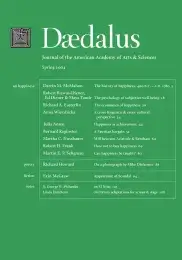The economics of happiness
Most of us, I think it is safe to say, would like to be happier, would like, indeed, to hold the ‘keys to happiness.’ For centuries the contemplation of this desire was the exclusive preserve of philosophers and theologians, who speculated and offered prescriptions on ‘the good life.’ Only fairly recently has it come into the domain of social science– first in psychiatry, where depression had been the object of concern, and then, since around 1950, in the mainstream social sciences. The impetus for social science research in this area during the last half century has been the development of population surveys inquiring into people’s feelings of well-being. A very simple survey question, for example, might ask a respondent, “In general, how happy would you say you are–very happy, pretty happy, or not so happy?” Another question might be, “How satisfied are you with your life as a whole– very, somewhat, so-so, not very, or not at all?”
Over the years a substantial methodological literature has developed to consider the value of the answers to such questions. The professional consensus is that the responses, though not unproblematic, are meaningful and reasonably comparable among various groups of individuals. Although there are subtle differences between happiness and life satisfaction, I will treat them for the present purpose as interchangeable measures of overall feelings of well-being, that is, of subjective well-being. My focus will be on what we are learning from the survey data on the causes of subjective well-being, and, based on this, what we might do as individuals to improve it.
As I go along I shall discuss two prominent and contrasting theories of well-being, one from psychology, one from economics. In psychology, setpoint theory has gained increasing attention in the last decade or so. Each individual is thought to have a fixed setpoint of happiness or life satisfaction determined by genetics and personality; life events such as marriage or divorce, job loss, or serious injury or disease may temporarily . . .
